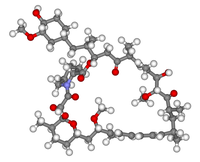
Photo from wikipedia
Acetyl-CoA carboxylase (ACC) is a rate-limiting enzyme in de novo fatty acid synthesis, which plays a critical role in the growth and survival of cancer cells. In this study, a… Click to show full abstract
Acetyl-CoA carboxylase (ACC) is a rate-limiting enzyme in de novo fatty acid synthesis, which plays a critical role in the growth and survival of cancer cells. In this study, a series of spiroketopyrazole derivatives bearing quinoline moieties were synthesized, and in vitro anticancer activities of these compounds as ACC inhibitors were evaluated. The biological evaluation showed that compound 7j exhibited the strongest enzyme inhibitory activity (IC50 = 1.29 nM), while compound 7m displayed the most potent anti-proliferative activity against A549, HepG2, and MDA-MB-231 cells with corresponding IC50 values of 0.55, 0.38, and 1.65 μM, respectively. The preliminary pharmacological studies confirmed that compound 7m reduced the intracellular malonyl-CoA and TG levels in a dose-dependent manner. Moreover, it could down-regulate cyclin D1 and CDK4 to disturb the cell cycle and up-regulate Bax, caspase-3, and PARP along with the suppression of Bcl-2 to induce apoptosis. Notably, the combination of 7m with doxorubicin synergistically decreased the HepG2 cell viability. These results indicated that compound 7m as a single agent, or in combination with other antitumor drugs, might be a promising therapeutic agent for the treatment of hepatocellular carcinoma.
Journal Title: European journal of medicinal chemistry
Year Published: 2020
Link to full text (if available)
Share on Social Media: Sign Up to like & get
recommendations!